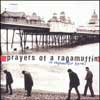A Ragamuffin Band
Genre: Rock/Pop
A Ragamuffin Band Bibliography: (click on each album cover to view tracks and A Ragamuffin Band lyrics)
A Ragamuffin Band Biography It's hard to imagine a more unlikely group of "Christian music superstars."
No, the Ragamuffins have earned their name'unkempt rockers who lead worship, sensitive guys with tattoos, tattered men who refuse to deny their frailty in order to sing the glories of grace'in fact, they insist that to do so would be to deny grace itself. They are a band that for nearly seven years has managed to coexist as the rare combination of rough-around-the-edges bravado, stark sensitivity, raw musical power and laugh-out-loud gratitude. They are a band that stands at the center of anti-gloss, who insist that grace conquers sin every time'even their own. And this year, they were a band worried about a sophomore slump.
After a best-selling album, several Dove Award nominations, years of touring as bandmates and co-collaborators with beloved singer-songwriter Rich Mullins, and solo careers that have earned enough critical accolades to bury their publicists in paper, the Ragamuffins have earned the right to be confident in the recording studio. And yet, as they came to the studio to record Prayers of a Ragamuffin, the follow-up to their breathtaking posthumous recording of Mullins' final songs, The Jesus Record, there was a sense of trepidation. For despite their supergroup credentials, The Rags never expected to be a real band. Gathered from their individual careers in the early 90s, they became the loose, motley, and sometimes explosive sonic backdrop for Rich's songs. Sensitive and stunning, their sound was a powerful musical quilt that still managed to reflect their strong individuality and at times, to be as disheveled as their leader's appearance. To put it plainly, the Rags were a unit because their friend had said so, and it was in serving Mullins' vision that they first found their purpose together.
But after Mullins' tragic death in September of 1997 and the difficult decision to record and tour The Jesus Record, the band was forced to find a way to honor the legacy left them by their friend, while at the same time moving on without him. "We knew where the boat was headed," says Jimmy Abegg, the Ragamuffin's lead guitar player and resident artist/photographer. "But moving on was daunting, because it's a great deal of responsibility to be given the opportunity to speak out from the soapbox Rich had so carefully constructed for us to stand upon." But it was, ironically, their year of touring The Jesus Record'and the focus that came from performing its material'that cemented the Ragamuffins' determination to continue as a unit. "Out on the road, we became a true band, a separate entity," says Ragamuffin producer Rick Elias, who shares lead vocals with bassist Mark Robertson. "We learned to listen to, follow and lead each other, while never forgetting the fact that we were building on Rich's music and audience."
But being convinced that they should continue as a band is one thing, knowing how to continue is quite another. If Mullins had brought them together, an equally strong bond would be needed to help them continue together. "The fact that we were finally a band didn't erase the fact that we are four very distinct personalities with four distinct musical visions," says Elias. "It was clear to me that to succeed, we needed some sense of cohesiveness, a foundation that would allow us to experiment with greater agility."
"In [The Jesus Record], we had been given a template of how to set a course for a project with meaning," says Ragamuffin drummer Aaron Smith, "one that would challenge and convict us in the process. As we began to think about what's next, we knew we would need material that would cause us to examine the life of Christ closely. Prayer, when examined, inevitably reveals the life and character of the one who prays. Because of that'because it would demand such honesty'it was a perfect focus."
The resulting season of writing'most of which took place on the road'allowed the band to work collaboratively for the first time. In fact, most of the songs on the disc are joint efforts of some sort. "It was actually pretty awkward at first," admits Jimmy. "None of us had much experience writing with each other, let alone as a group. But we needed more to hang our hat on than more songs by Jimmy, Rick, Mark and Aaron. Rick did an excellent job of directing us, along with Mark Robertson and (Myrrh Records vice president and general manager) Jim Chaffee, and the proof is in the record."
Indeed. The hard work of writing together produced a batch of songs that follow The Jesus Record perfectly. Moving the band from an extended reflection on the person of Christ to a meditation on the nature of our relationship with him, Prayers of a Ragamuffin led the group on a path reflective of the lessons learned from their late friend but gave them a voice that is entirely their own. The resulting group of songs about prayer share an approach that is disarmingly personal and yet grounded in history. "Our goal was to make a record that was both diverse and cohesive," says Elias. "We wanted to speak about our condition and hopes as people of prayer. We wanted to touch on the most intimate of places in our lives and still be bound by history. We made a conscious choice to join with the rest of the church in the great prayers of the past.
"And after many years working both inside and on the fringes of American Christianity," he continues, "I have grown weary of its self-centeredness, its demagoguery, its arbitrary legalism, and its obsessive cult of personality. Joining in prayers that have been offered by millions of Christians over hundreds and even thousands of years promises a kind of other-centeredness and comfort that I can't get from individualistic notions of 'just Jesus and me.'"
That conscientiously traditional approach to the theme of prayer brought the project a complexity and depth rare in Christian pop music. This is most evident in the disc's first single, the stunningly exhalant "Make Me An Instrument." Based on the Prayer of St. Francis of Assisi and the Breastplate of St. Patrick, this song sets the sonic and thematic tone for Prayers of a Ragamuffin. "Make Me An Instrument" draws from the rhythmic, rock urgency that the band has perfected on the road, and juxtaposes it with a huge pop song production, layering horns, strings and voices that seem to strain against the confines of simple earth. The resulting fusion of rough-around-the-edges fury and lush, transcendent orchestrations forcefully reminds the listener of the incredible musical breadth found in these four Ragamuffins. Reflected here, too, is the painful, glorious challenge at the heart of all our prayer lives. At the heart of Prayers of a Ragamuffin is a commitment to a musical and thematic diversity that is rare in pop music these days'especially pop music driven by devotion. But as the band sat to assemble the songs, they committed to creating something that reflected every season of prayer.
Fans of the contemplative, soulful reflections that anchored Mullins' work will find companions in the confessional ballads "Help Thou My Unbelief" and "God Grant Me the Tears," both of which find the band praying through doubt and throwing themselves at the mercy of a compassionate Father. More upbeat, but equally compelling "Nothing You Don't Know" and "Bouncing Off the Ceiling" find ways to cleverly examine the same themes and yet, both musically and lyrically, remain wistfully resilient. And those who remember the straight-ahead power of Elias' and Robertson's solo work will revel in the full-on rock of "Faith Hope Love" and "Shout," both filled with an energy rarely matched in either the mainstream or Christian rock markets. These songs also find the Rags leading their audiences in celebration and praise'a fact that band members laughingly admit is ironic, given their lack of resemblance to the "typical" clean cut church worship leader. They are, after all, ragamuffins.
That willingness to be broken saturates Prayers of a Ragamuffin. These prayer-songs drip with a kind of self-knowledge we all share, but few confess'the kind of vulnerability that demands humility, avoids pretension, and drives us to grace. In fact, if there is a unifying theme to the project (aside from grace itself), it is that frailty is necessary to victorious Christian living'a theme they learned in spades from their mutual mentor, Christian author Brennan Manning.
"Our faith is triumphant," insists Elias. "We will be victorious, but not necessarily in the here and now. Today we have to struggle to be faithful, and give thanks for the kindness of God that leads us to repentance. The insistence of some believers that we can somehow compel God to do our bidding is nothing less than sorcery."
"No one lives triumphantly except by the spirit," contends Abegg. "The Ragamuffins are just a bunch of knuckleheads who have been called to serve, and we have to do so honestly. And we believe that brokenness should be the theme for every Christian. It's what our need'and his grace'is born in." And that is the mission of the Ragamuffins: to call people to a God who meets us in our brokenness'indeed, a God who became broken on our behalf'and who transforms us in the meeting.
Drummer Smith sums it all up. "Maybe all ragamuffins'and by that I mean everyone who claims to be a believer in Jesus'will catch on and come out of the closet of their togetherness and admit their brokenness, their occasional unbelief, their failures, their struggles. Confession reveals the true self. And maybe, in that confession, we'll discover a kind of transformation takes place that all our self-righteousness could never create."
|




